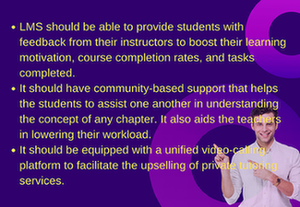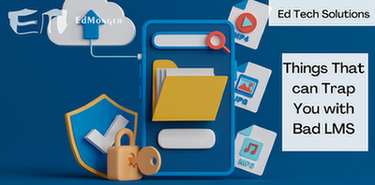If you wish to give your students access to an efficient online learning environment. It is imperative to choose wisely the best learning management system (LMS) for schools/colleges.
The LMS stands for learning Management System offers the most practical training module. You can take your schools/colleges or edtech company to the next level and teach your students no matter where they are in the world.It helps organisations reduce expenses like finding the best location and paying for the services of trainers.
The edtech industry is growing, and online learning is approaching the next level. The right LMS is much needed in educational institutions as it provides convenience and adaptability, which is one of the major concerns.
However, when deciding on an learning management system for your institute or classroom, you will need to perform a great deal of study. Because of this, to spare you some time during your study, we have compiled a few pointers, techniques, mistakes, and other relevant considerations you need to consider.
Let’s check it out..!
Mistakes To Avoid Or Things To Consider Before Selecting LMS
Focus On Flexibility To Keep Your Business Future Proof
Every piece of software is constructed in accordance with a fundamental learning management system that satisfies the fundamental needs. When selecting an LMS, many people focus solely on its basic capabilities without considering whether or not those features are adaptable to alteration in the future.
If you want to do some customization, you won’t obtain that facility because of lack of functionality, which prevents you from making changes per your requirements.
If your objective is clear, then you will know what you have to offer to your students; in such situation, if your software does not support you, then it becomes a headache for you in the coming times.
So whenever you choose an LMS, do it keeping in mind your objective and not the offerings.
As per our suggestions, you must go with the open-source LMS; you can effectively develop multi-featured courses per your institute’s requirements. Besides, you have the option or freedom to extend the functionality and improve the capability of your platform to keep up your business both in the long and short term.
When making your decision regarding LMS, always keep the following considerations in mind:

Also read: How Digital Technology and Practices Facilitate School Improvement?
Provide Optimum User Experience
The quality of the user experience is crucial in online teaching and learning. While an instructor in front of a classroom has many opportunities to connect with his students one-on-one or in small groups, this is not the situation when students are learning online; therefore, it is important to consider this factor when deciding which learning management system (LMS) to use. The tasks you plan should be interesting enough to attract students’ attention. And that participation can only occur with a satisfying experience for the user.
Both students and teachers should enjoy using an LMS. Thus its design must prioritize their needs.
User Experience for Admin
- The LMS administrator should be able to set up the system with minimal effort.
- LMS features should be intuitive enough to be utilized by anyone, and the course content should be easily comprehended by both the instructor and the student.
- It should come up with a streamlined and automated process that is required for handling routine or repetitive tasks.
User Experience for Students
- Your learning management system ought to be designed so that it is user-friendly for learners and assists your students in carrying out efficient learning and instruction.
- The learning management system ought to be configured to respond to the student’s needs as and when those needs are expressed.
- The LMS is simple to use, and students may log in whenever it’s most convenient to access, start their course, and download the content anytime.
Also read: Edtech tools that will rule the education industry in 2023
The Level and Quality of Customer Support Provided
If you have previously used a learning management system (LMS), you would know how important the level of customer support can be. These days companies are focusing on online learning tools and softwares which provide excellent customer service. Because nobody knows when a problem or an issue knocks on your door, technical assistance is a must.
To get information about the customer support services of LMS, you can ask the most basic inquiries, like support availability, preferred methods of contact, average response time, and anything else you feel is important. After inquiry, if you feel satisfied with their commitments, you can proceed with them.
Besides, you can find out the answers to the following questions:
- Will they assign a dedicated customer success manager to your team?
- What are the support hours?
- Will they cover public holidays?
- Are they readily available for your queries?
- Will They provide telephone or email support?
Reliability, scalability, and security
If an LMS is reliable, scalable, and secure, you won’t have to give it a second thought before competing at the highest level. These three considerations have a significant impact on the reputation of your company.
So whenever you select an LMS, collect in-depth information about these three factors from its vendor. After that, if you feel that the vendor has been able to give correct information about these three factors, which will benefit your business in the long term, then you can trust that vendor.
Questions to ask potential vendors about these concerns are as follows.
- Can our usage be increased to a larger scale?
- What are the chances of getting more people to use it if we need to?
- How often does it go down? How often are system status checks performed?
- Does your organization have a strategy to bounce back from a major setback?
- Were there any previous security breaches?
Product Expansion
If you get the green signal from all the points given above, then the last thing you have to do is to gather information about the future expansion of the product. You can ask the vendor what new additions will happen in the features being provided now, after how long they update this LMS, what is the long-term planning of this product in the future, etc.
This will give you an idea of how strongly managed the product you are about to make, how long-term it is, etc.
Thoughts
We are confident that in the future, this article will help to choose an LMS for your school with the considerations mentioned above in mind and without considering the vendors’ sales pitches. If you still have questions, you can ask us in the comments.




